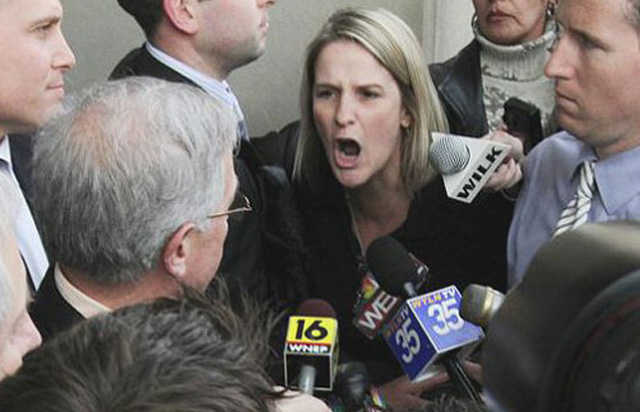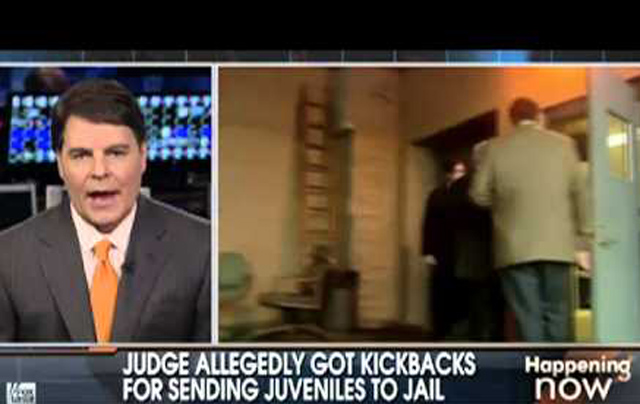CHICAGO – Patrick McDonald of HollywoodChicago.com appears on “The Morning Mess” with Dan Baker on WBGR-FM (Monroe, Wisconsin) on March 21st, 2024, reviewing the new streaming series “Manhunt” – based on the bestseller by James L. Swanson – currently streaming on Apple TV+.
Documentary ‘Kids for Cash’ Shares Multiple Viewpoints
 Rating: 3.5/5.0 |
CHICAGO – The funny thing about documentaries is that any goal of truly replicating reality, or the truth, is impossible. Unless a documentary film were to convey an experience with 360 degrees and 24/7 coverage (AKA life), it will always be a subjective endeavor. Documentary storytellers are always creating a point of view, simply by choosing where to point a camera, and where to cut a sequence.
While “Kids for Cash” does not achieve such a breakthrough in that respect, it is a rare documentary that nudges viewers closer to having an impression of a situation’s both sides. With an elaborate story, (one that is literally charted out by one of its subjects), it does show a big picture, with two distinct halves. Keeping to the complications within its center story, “Kids for Cash” does give its villain, one with surprising complications, a distinct amount of screen time.
“Kids for Cash” is a documentary about Mark Ciavarella, a Pennsylvania judge who ruled juvenile court cases with zero tolerance. He sentenced children to jail for minor mishaps, challenging their development into adulthood. When people begin questioning his ruthlessness, a larger scandal is unveiled that questions whether Ciavarella was paid by jails to send them kids.

Confrontation in the Documentary ‘Kids for Cash’
Photo credit: SenArts Film
“Kids for Cash” begins with painting a disturbing picture of different fates handed down to children by a ruthless zero tolerance system by a local judge, Mark Ciavarella. We meet various kids who have been under his wrath, and hear the stories of their harmless illegal crimes. One kid is locked up for making a MySpace page for her professor. When she recollects the event, she says, “I’m now one of those people in themovies!” (she is credited as “MySpace Page Incident”). A local journalist tells her involvement with the story, which involves collecting a large group of similar grievances from parents, to understand the big picture.
And then, Ciavarella’s voice upgrades from a brief ominous voiceover in the beginning to a full-on character in the story. His involvement makes the tale even more complicated, the POV of headlines from earlier less trustworthy. Even with the aforementioned reporter, it turns out that she was actually speaking more to his defense the entire time.
“Kids for Cash” provides a significant amount of time for its juvenile arrestees. But as for emotional soap-boxing, Ciavarella gets the same. In a striking moment, he shares a home video of his own; like the parents of the children he put in jail, he gets to have his own scenes of grave emotional conflict, while trying to support what he thinks was right.
With Ciavarella’s involvement, the plot literally thickens, it expands, it gets some real substance. The film’s debates continue throughout, of which “Kids for Cash” does a decent job of trying not to pick an answer, though it does have an immediate sympathy for its youth. Are the parents not accurately disciplining their kids, or is Ciavarella wrapped up in an outdated form of parenting? Was “Kids for Cash” a snappy concept that got away from the real issues, those of which Ciavarella was trying to address? Throughout this, Ciavarella gives a remarkable performance, however honest his words may be.
With newspaper headlines used as punctuating dramatic moments, “Kids for Cash” withholds from becoming a media frenzy, or a “60 Minutes” episode, despite the different weight at hand. It is, however, a movie of very specific storytelling choices, considering how it reveals the life tales of previously incarcerated teens.

The Media Picks up the Story in ‘Kids for Cash’
Photo credit: SenArts Film
One moment in particular involves a mother shouting at Ciavarella, in a shocking instance that binds both sides of the film together into very tragic moment. What she shouts at Ciavarella is very disheartening, and through her volcanic display of internalized outrage, clues us into what happened with her son. Earlier, the film had made it sound one way; but we know now with this scene as to what direction we were being specifically being led in its story. It’s as specific and questionable as a choice as when the closing credits brandish that angelic cover of “Creep” from that famous “The Social Network” teaser, accompanied by an onslaught of bummer percentages.
As a documentary and narrative experience, “Kids for Cash” is worth a curious look. Its outrage spread across a far more complicated plane, it is rare to see a documentary that makes a case for its villain as much as its victims.
 | By NICK ALLEN |


